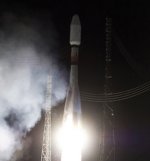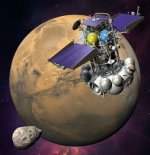Soyuz launches six satellites from Kourou
 Sat, Dec 17 - A Soyuz rocket lifted off from Kourou Friday night, placing six French and Chilean satellites into orbit. The Soyuz STA rocket lifted off from Kourou, French Guiana, at 9:03 pm EST Friday (11:03 pm local time Friday, 0203 GMT Saturday) and placed its payload of six satellites into Sun-synchronous orbit over the next three and a half hours. The launch's primary payload was the Pléiades 1A imaging satellite, built by EADS Astrium with a camera provided by Thales Alenia Space. The one-ton satellite is operated by the French space agency CNES and will be used to provide high-resolution Earth images for civil and military applications. Also on the Soyuz were four Electronic Intelligence by Satellite (ELISA) signals intelligence satellites, each weighing 120 kilograms and built by Astrium and Thales, for the French military. The Soyuz also placed into orbit the 117-kilogram Sistema Satelital de Observación de la Tierra (SSOT) Earth imaging satellite built by Astrium for the Chilean government. The launch was the second time a Soyuz has flown from Kourou, after the inaugural Soyuz launch in October that carried two Galileo navigation satellites.
Sat, Dec 17 - A Soyuz rocket lifted off from Kourou Friday night, placing six French and Chilean satellites into orbit. The Soyuz STA rocket lifted off from Kourou, French Guiana, at 9:03 pm EST Friday (11:03 pm local time Friday, 0203 GMT Saturday) and placed its payload of six satellites into Sun-synchronous orbit over the next three and a half hours. The launch's primary payload was the Pléiades 1A imaging satellite, built by EADS Astrium with a camera provided by Thales Alenia Space. The one-ton satellite is operated by the French space agency CNES and will be used to provide high-resolution Earth images for civil and military applications. Also on the Soyuz were four Electronic Intelligence by Satellite (ELISA) signals intelligence satellites, each weighing 120 kilograms and built by Astrium and Thales, for the French military. The Soyuz also placed into orbit the 117-kilogram Sistema Satelital de Observación de la Tierra (SSOT) Earth imaging satellite built by Astrium for the Chilean government. The launch was the second time a Soyuz has flown from Kourou, after the inaugural Soyuz launch in October that carried two Galileo navigation satellites. Related Links: NASASpaceFlight.com, BBC article, Reuters article
Phobos-Grunt expected to reenter next month
 Dec 18 - Russian officials now believe the Phobos-Grunt spacecraft, stranded in Earth orbit since its launch in early November, will reenter some time next month. Officials said late in the week that they expect the spacecraft to reenter between January 6 and 19 based on the current delay of its orbit, an estimate that agrees with outside analysis of the spacecraft's changing orbit. The Mars-bound spacecraft was launched in early November, but controllers lost contact with the spacecraft shortly after entering orbit, and the spacecraft's engines failed to fire to boost the spacecraft towards Mars. Efforts to restore communications with the spacecraft have failed, although an ESA ground station did detect signals from the spacecraft for a brief time in late November. Russian officials have given up hope of restoring control of the spacecraft before its reentry.
Dec 18 - Russian officials now believe the Phobos-Grunt spacecraft, stranded in Earth orbit since its launch in early November, will reenter some time next month. Officials said late in the week that they expect the spacecraft to reenter between January 6 and 19 based on the current delay of its orbit, an estimate that agrees with outside analysis of the spacecraft's changing orbit. The Mars-bound spacecraft was launched in early November, but controllers lost contact with the spacecraft shortly after entering orbit, and the spacecraft's engines failed to fire to boost the spacecraft towards Mars. Efforts to restore communications with the spacecraft have failed, although an ESA ground station did detect signals from the spacecraft for a brief time in late November. Russian officials have given up hope of restoring control of the spacecraft before its reentry.
Related Links: RIA Novosti article
 First navigation signals heard from Galileo satellite
First navigation signals heard from Galileo satelliteEngineers are analyzing the first signals from a Galileo navigation satellite after its payload began switching on last week for testing, according to the European Space Agency. FULL STORY
 Soyuz rocket rolls out for next South American launch
Soyuz rocket rolls out for next South American launchThe second Soyuz rocket to fly from the commercial launch base in Kourou, French Guiana made a short but meaningful trip Monday when it was rolled from the assembly hangar to the pad and rotated to stand up vertically. PHOTO GALLERY
No comments:
Post a Comment